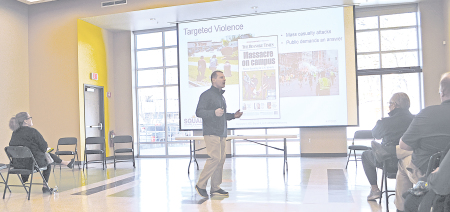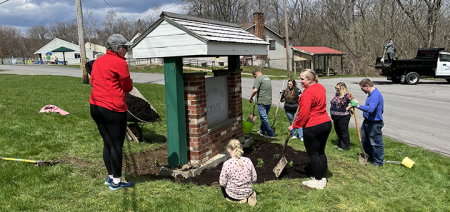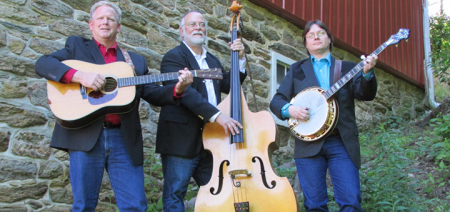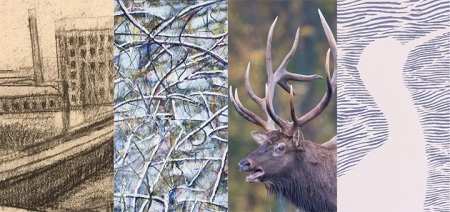Tilting At Windmills: Mrs. Pomfrey’s Elderberry Wine
Published:
June 16th, 2023
By:
Shelly Reuben

If only Grover hadn’t been such a competent detective. If only we hadn’t gone to the Pomfreys’ house that first time to drink elderberry wine or that last time to pick up our paperwork. If only Herb hadn’t been such an avid gardener or Hilda such an overpowering ogre. If only. If only. If only....
It all started when my husband did one of those soul-mate things that, if you loved your spouse, would be considered endearing, but if you didn’t, would leave you banging your head against a wall. I adore Grover, so when he opened his police department retiree newsletter to the classifieds, I listened as he read aloud: “Fifteen acres for sale in Chesterfield County. Perfect site for retirement home.” Then he let the newsletter fall to his lap, lifted his gorgeous brown eyes to me, and added, “You know, Ellie, I’ve always wanted to own a place in the country.”
This was the aforementioned “soul-mate thing,” because in all the years that I’d known him, Grover had never once mentioned he wanted to live anywhere even remotely in the vicinity of a cow. But I’m nothing if I’m not flexible, so I shrugged, sighed, and said, “Make the call.”
A woman answered the phone. She said her name was Hilda Pomfrey, her husband was Herbert, and that the property in question was on Route 32, just outside the village of Terrence, and it had two creeks and a hidden field. She explained further that Herbert, who’d retired from the police department 17 years before, had bought the land with his first wife, Betty, hoping to build a cabin on it when they retired. But Betty died of a stroke at age 32, and Herb got lonely. Soon, without quite knowing how it happened, he found himself married to Hilda, who lived next door.
Throughout Mrs. Pomfrey’s narrative, Grover was giving his own interpretation to what she said. For example, when Hilda told him that she had agreed with Herb’s plan to retire to his property upstate New York, what Grover heard was “I’ll make him sell the land, buy a condominium, and we’ll move to Florida.” And poor Herb (why in the world had he married her?) gradually began to see his dream of a cabin in the country fade away.
If you are wondering why a woman on the phone would tell so much to a man she had never met, it’s because Grover is a great listener. There’s something about him that makes virtual strangers want to tell him their life stories. Al Gottleib, his partner when he was a cop, says that when Grover was on a case, suspects stood in line to confess.
Anyway, by the time Grover hung up the phone, Hilda Pomfrey had promised to send us a map so that we could locate their property. Within two days – it was on a Thursday – Hilda’s map arrived in the mail. Two days later, at seven o’clock on Saturday morning, we hit the road. Five hours after that, we finally…finally…found what we were looking for.
We would have missed it entirely, except that the third farmhouse at which we stopped to ask directions was directly opposite the 15 acres we were looking for. Claire and Leo Hartmann, the couple who lived there, told us they had purchased their house plus 85 acres from Hilda and Herb Pomfrey 12 years earlier, and that it was part of a homestead that originally had included the 15 acres across the street. Then the Hartmanns told us a cautionary tale.
“When we were negotiating to buy our place,” Claire said over a cup of coffee and the best oatmeal cookies I’ve ever eaten, “Mrs. Pomfrey failed to inform us that all of the pipes were broken, the roof leaked, and the basement flooded.”
Leo Hartmann added, “We wanted an engineer to inspect the house before we signed the contract, but the old witch said, ‘Take it or leave it.’ We were out of options, so we took it. Sight unseen.”
Claire fiddled with a cookie for a second or two, and then put it back on her plate. When she raised her head, she looked ten years older and a thousand times wearier. “Back then,” she said. “Our oldest boy, Jimmy, was nine. The twins were five, Corey was two, and I was seven months pregnant with Sandy. Our house on Long Island was a rental, and the lease was running out. We’d been planning to renew, but…. ”
Leo continued. “I had a machine shop two blocks away. One night, someone pulled a van up to the back door of my shop and stole all my tools, equipment ... everything. I didn’t have property insurance, and just like this,” he snapped his fingers, “I had no way to make a living, and we had nowhere to live. A week before the shop got looted, we’d heard about this place. So it was come here or nothing.” Leo shrugged. “We came.”
An unhappy start for a new life. A happy ending, though, because they eventually came to love their new (old) home. But only after the ordeal of fixing a leaking roof, replacing a furnace, sealing cracks in the foundation, and repairing broken pipes. On top of which, Claire had to lug water from the creek to the kitchen in the winter three times a day, and all while being pregnant.
Leo went on to build a new machine shop behind the farmhouse; Claire did his bookkeeping and raised their five kids. They loved the village of Terrence, loved their property, and made it perfectly clear that if we moved across the street, they were more than willing to love Grover and me, too.
I don’t know which my husband wanted more: the fifteen acres, or the Hartmanns as neighbors, but later that day, we called the Pomfreys, and made an offer to buy their land.
Mrs. Pomfrey, of course, did the negotiating. I won’t bore you with her bargaining tactics. I’ll just say that two weeks later, on a gorgeous Sunday in May, Grover and I got into our car and drove to a sleepy hamlet on Long Island to sign a purchase agreement and hand-deliver a check.
Hilda answered the door, and Herb stood behind her.
Do you remember the nursery rhyme about Jack Sprat? It goes like this:
“Jack Sprat could eat no fat
His wife could eat no lean
And so betwixt the two of them
They licked the platter clean.”
In classic illustrations, Jack is needle-thin and knobby-kneed, whereas Mrs. Sprat, with a head like a pumpkin and tiny black eyes, is as big as a cow. Herb Pomfrey was Jack Sprat brought to life, and we all know who Hilda was.
It was a warm day, so we could see thin arms and bony wrists jutting out of his short-sleeved open neck shirt. His collarbones stood out like perches for canaries, and thin, sandy-brown hair barely covered his narrow head.
Despite Herb’s big nose and sunken cheeks, he had an oddly likeable face. His gray eyes were defeated, of course. After all, the poor fool had married Hilda. But Herb’s smile, although timid, could not concealed a whisper of whimsy ... a dash of the dreamer. I liked him right away.
On the other hand, you could squeeze nine Herbs into the bodysuit of one Hilda. She was every ogre from every fairytale, compressed to fit into one tent-sized ugly polyester paisley print dress.
Despite her forbidding aspect, she was cordiality itself. First, she gave us a tour of their house – oppressively decorated with heavy Victorian furniture, Waterford crystal, snake plants, and crocheted doilies. Then Hilda suggested that Herb show us the backyard and garden while she set the table so that we could partake of her date nut bread and homemade elderberry wine.
Herb’s garden consisted of a few clumps of peonies, half-a-dozen irises, and two islands of narcissus, all neatly surrounded by dark red mulch. Nothing special. The yard, however, was a real jaw dropper. It had to be at least an acre, with a perimeter of privet hedges over ten feet tall. Between the hedges and the back of the house were dozens … maybe hundreds … of small, weird looking trees with smooth gray trunks covered with what looked more like sharkskin than bark. They were topped by branches that unfurled like umbrellas and dangled large luscious leaves shaped like spades in a deck of cards. I’ve never seen anything remotely like them before or since.
Each in that odd backyard was separated from its sister tree by about eight feet of lawn, the fingertips of their branches often touching. Other than its unlikely existence, the most perplexing thing about this odd little arboretum was the pride and joy that Herbert Pomfrey took in it, like a father showing off his high school honor student-kids.
Grover and I followed him until we got to a wide swath of grass at the outer edge of the arbor, presumably reserved for more trees. After that, Herb led us back to the house.
Hilda had set the table with crocheted placemats, date nut bread on small china plates, and four delicate wine glasses. In the center of the table was a beautiful cut glass decanter containing what I assumed was elderberry wine.
There was something disorienting about a mean-spirited behemoth presiding over such an elegant ritual, but we played our parts, and the only glitch in the proceedings occurred when Hilda tried to prevent us from adding “a prepayment without penalty” clause to the purchase agreement. But we were adamant about its inclusion, and she eventually gave in. We sealed the deal by clicking glasses, oohed and aahed over her date nut bread, and left their house with a contract to buy what turned out to be 25 instead of 15 acres (we had it surveyed at our own expense), five miles north of the village of Terrence, in Cow Country, USA.
The next few years were fun, with occasional moments of angst. First, we considered building a cottage on our land, but when the ancient one-room schoolhouse adjacent to our property went on sale, we snatched it up. After that, we endured the nerve shattering ordeal of mice, snakes, frozen pipes, drafty walls, leaky roofs, spiders, and dead birds in the Ben Franklin stove. Little by little, though, our house of horrors became a dream domicile.
The private investigation business Grover had started after he retired (he specializes in insurance fraud) grew, our income increased, and one day, five years after we bought our 25 acres from the Pomfreys, my husband called them on the phone. But he had only managed to say “Our next check will be a payoff figure on the mortgage” before Hilda launched into a tirade I could hear through the receiver, even though I was standing 10 feet away.
“Deceptive. Fraudulent. Scheming. Manipulative” were some of the accusations she hurled our way before, five minutes into this one-sided conversation, she hung up on us.
Grover and I stared at each other. Stunned.
The very next day, we got a certified letter from Mrs. Pomfrey accusing us of all manner of skullduggery. At first, we were appalled. Then numb. Then, perceiving humor in the situation, amused. We decided to let a few days go by before we mailed the check. Ten days later, our bank informed us that it had been deposited into the Pomfrey’s bank account, which meant that pending receipt of the satisfaction of mortgage and the deed, the 25 acres belonged to us. Free and clear.
In the intervening weeks, we spent many hours with Claire and Leo, gleefully exchanging Hilda stories. We agreed that although Herb was a sweetheart, his wife was a villainess and a bad joke.
Originally, Grover and I intended to wait a few weeks for Hilda to mail us our paperwork, but that plan changed when Grover got assigned a trip-and-fall investigation at a shopping mall two miles east of the town where Hilda and Herb Pomfrey lived. Grover suggested that I accompany him to Long Island, and that we stop in on the Pomfreys on our way home.
I leaped at the opportunity. But when my husband dialed the Pomfreys’ number to tell them our plans, it wasn’t Hilda who answered the phone, it was Herb. Dear, sweet, overwhelmed and always-intimidated Jack Sprat. Grover told him what we wanted, and Herb said ... actually sounding pretty perky ... “I’ll have everything ready when you get here. And if you have time, perhaps we can celebrate afterward with a nice glass of elderberry wine.”
Grover ended the call, and stared at me dumbfounded.
We were similarly disconcerted when we parked in the Pomfrey’s driveway and Herb opened the door. But this was a different Herb than the one we’d met five years earlier. He was wearing a frilly apron over his cuffed trousers. In his right hand, he was waving a wooden spoon covered with what looked like vanilla frosting. His beautiful gray eyes were twinkling, and he was smiling. Not the timid smile we had seen before. A big, broad, wonderful smile.
“Come in! Come in,” he said happily. “All of your documents are ready, and I just finished frosting the cake.”
Herb had set plates, cups, cake, and wine glasses on a patio table overlooking the backyard. The sun was shining, the breeze was gentle, and it was a glorious afternoon. The cake, by the way, was delicious. A thousand times better than Hilda’s date nut bread. And it was amazing how much better Hilda’s elderberry wine tasted without Hilda. Which brings us to the subject of Herb’s belligerent bride.
“Where is she?” Grover asked after his third piece of cake.
“Florida,” Herb toasted her absence with another glass of wine. “She went ahead of me to get the condo ready, since we’re moving down there permanently next week.” Then he looked around his backyard, and his appreciative glance seemed to take in every one of the dozens … maybe hundreds … of small trees with spade-shaped leaves that he had planted so lovingly over the years.
“Are you going to miss them?” Grover asked. And when Herb returned a blank stare, my husband clarified. “The trees. Are you going to miss the trees?”
Herb grinned. What a nice face he had. What kind eyes. “No,” he said merrily. “I can’t wait to sell this place.”
After another piece of cake and another glass of elderberry wine, Herb excused himself to retrieve our papers, and Grover took my hand, and led me into the backyard. I followed him through that Alice in Wonderland maze of trees, turning this way and that until we reached their far perimeter, which, since our first visit, had crept at least ten feet closer to the hedgerow.
About twenty minutes later, we thanked Herb for his hospitality. I kissed him on the cheek, got into the car, and as Grover pulled into the street, I stuck my hand out the window and waved to that dear, sweet man as if I were waving to my father from the train on my way to summer camp.
Even though our deed and satisfaction of mortgage were in perfect order, Grover was oddly silent all the way home.
This is the part where, soul-mate considerations notwithstanding, I reveal how my husband and I are different. Grover’s morality is based exclusively on right and wrong. Mine, however, is equivocal, and I’ve been known to make excuses for amiable dispositions and twinkling eyes.
Seeing that my husband was bothered, and realizing that I had already put it off for too long (I knew what he was thinking), I asked Grover when he had first become suspicious.
“Oh. I was never suspicious, Ellie. I always knew.”
I frowned and thought for a bit. “When did you know?”
“The minute that Herb picked up the phone.”
“Knew what? Knew how? Knew why?”
“I knew that Herb was happy. You knew, too. Seriously, Ellie? How could anyone not know?”
Grover was right. I had always known.
Funny thing is, all these months later and despite his drastic change in circumstances, Herb is no longer unhappy. In fact and unmistakably, he is very happy indeed.
After we left him in Long Island that day, Grover called a friend at the Nassau County Police Department. Minutes later, two detectives were dispatched to the Pomfrey house with a search warrant. Grover told them to look for a tree near the hedgerow where the sod had recently been disturbed and the spade-shaped leaves were withered and dry. Characteristic of Hilda, isn’t it? That even her mortal remains were bitter. Any other dead body would have made excellent fertilizer.
Or so Herb later explained.
I visit him every few months. Grover comes with me from time to time, and Herb loves to see us both. He bears my husband no grudge, and Grover likes him. A lot. Our friend, and Herb has become a friend, now teaches horticulture classes in prison, and the guards have given him a little garden where he and his fellow inmates cultivate vegetables. I never saw it, of course, but Herb says it is a most satisfactory plot of land.
In answer to my question, he has also assured me that nowhere within the prison’s perimeter are there any trees with umbrella-shaped branches and spade-shaped leaves.
“Somehow,” he added with his bewilderingly beautiful smile, “I just don’t seem to like them anymore.”
Copyright © Shelly Reuben, 2023. Shelly Reuben’s books have been nominated for Edgar, Prometheus, and Falcon awards. For more about her writing, visit www.shellyreuben.com
Author: Shelly Reuben - More From This Author
Comments








